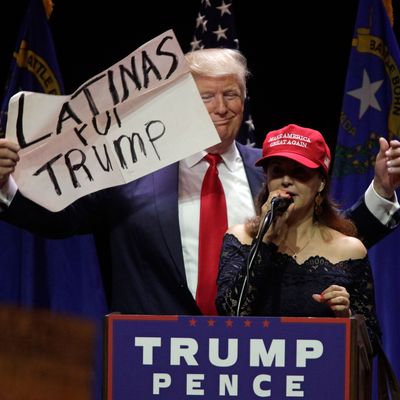
One of the big post-election debates revolves around Donald Trump’s performance in a demographic that was once expected to bury him: Latinos (or Hispanics, if you prefer that term). The shocker is that according to the official media-sponsored exit polls, Trump won 29 percent of the Latino vote, 2 points higher than Mitt Romney in 2012, and only 2 points less than John McCain in 2008. (Thanks in part to minor-party voting, Hillary Clinton’s 65 percent of the Latino vote fell below Barack Obama’s 67 percent in 2008 as well as his 71 percent in 2012.) This was after a highly publicized nomination and general-election campaign in which Trump constantly fanned nativist flames and on more than one occasion spoke of Latino undocumented immigrants (whom he promised to deport) as prone to violent criminal activity.
The numbers were so surprising that a leading polling organization specializing in public opinion in this demographic, Latino Decisions (whose principals, it should be noted, did some work for Hillary Clinton’s campaign), publicly disputed the exit polls, citing their own election-eve survey that showed Clinton winning Latinos by a 79/18 margin. This continued a long-running argument over the quality of exit polling among Latinos, which even the exit pollsters themselves have admitted might have been off in the past, in part because of a shortage of Spanish-language interviewers.
On the other hand, Harry Enten of FiveThirtyEight has taken a look at the exit polls and Latino Decisions’ very different assessment of the 2016 vote and finds the former at least as credible as the latter:
Other polls that surveyed only Latino voters, such as the New Latino Voice poll, generally reported a Clinton margin that was larger than that reported by exit polls, but smaller than the one in the Latino Decisions survey. Polls that surveyed the entire electorate generally agreed with the exit polls. An average of the seven live-interview national surveys conducted in the final weeks of the campaign indicates that Clinton led Trump by 33 percentage points among Latinos. And a post-election online poll of the entire electorate from SurveyMonkey had Clinton ahead among Latinos by 39 percentage points. Both are similar to the 36-point lead found by Edison in its exit poll.
Accepting for the sake of argument that Trump did do at least as well as Romney among Latinos, what could provide an explanation? Some analysts suggest Trump’s polarizing rhetoric on undocumented immigrants actually struck a chord with some Latinos who have been in the country for a long time or who utilized the authorized legal channels for entering and staying in the U.S. Another possibility is that issues other than immigration mattered more to many Latinos, such as the Cuban-Americans of Florida who appear once again (even according to Latino Decisions) to have given a majority of their votes to the Republican nominee. (Obama’s normalization of relations with the Castro regime, which obviously occurred after his 2012 reelection, helps explain why Clinton did not do as well with this subgroup this year.) It is also possible that changes in subgroup turnout had an impact. Even Latino Decisions showed Trump winning 37 percent of “born-again” Latinos; they may have reflected the elevated turnout also evident among white evangelicals.
There is one final factor that I haven’t heard anyone raise so far: Perhaps we don’t realize exactly how much Mitt Romney alienated Latino voters in 2012. He was well to the right of nearly all his nomination contest rivals on immigration issues, and a lot of the Daddy Warbucks image the Obama campaign was able to foist upon him may have repelled Latinos — who were really hammered by the Great Recession — disproportionately. In other words, white working-class voters may not have been the only ones who found Trump more attractive than Mitt in terms of his basic economic orientation.
This is a mystery worth figuring out. Otherwise Republicans may simply conclude they have little to fear from Latinos in 2020 or beyond.






























